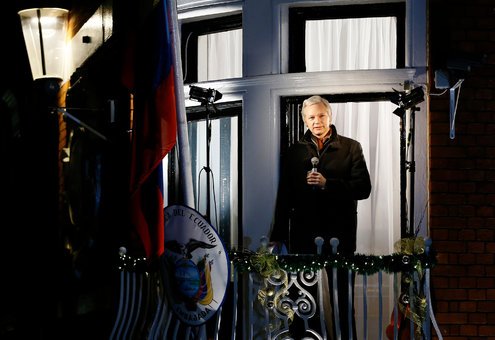
On Feb. 6, Judge Arbuthnot rebuffed a claim by Mr. Assange’s lawyer, Mark Summers, that the warrant was void because it stemmed from a Swedish extradition request that has since been withdrawn.

Credit
John Stillwell/Press Association, via Associated Press
On Tuesday, she rejected the argument that the warrant was contrary to the public interest, saying that Mr. Assange’s “failure to surrender has impeded the court of justice.”
Mr. Summers gave no immediate public response to the judge’s decision.
In the courtroom’s public gallery, which held a large contingent of Mr. Assange’s supporters, many of the judge’s comments met with gasps and murmurs of disapproval. Afterward, several of his allies cited a 2016 ruling by a United Nations human rights panel, stating that Mr. Assange was the victim of arbitrary detention.
“I think it was appalling that the judge was disrespecting the decision of the U.N. working group,” said Susan Gianstefani, 50, referring to the panel. “Julian Assange is being harassed because of WikiLeaks.”
Emily Butlin, 47, said the judge “spoke as a representative of the U.K. government, assisting government in their work instead of representing justice.”
Judge Arbuthnot dismissed the United Nations group’s finding as ill informed. The British authorities have said in the past that Mr. Assange is in self-imposed isolation, not detention.
WikiLeaks released in 2010 a trove of government documents provided by Chelsea Manning, a United States Army analyst, which American officials said harmed national security.
In 2016, it published emails, hacked by Russian intelligence, that were damaging to Hillary Clinton’s presidential campaign. Mike Pompeo, the C.I.A. director, has said that WikiLeaks acts “like a hostile intelligence service.”
Timeline
Julian Assange: A Legal History
Here are key points in his case since WikiLeaks burst onto the digital scene in 2010.

Attorney General Jeff Sessions said last year that arresting Mr. Assange was a priority for the Justice Department. But no charges against him have been made public, and it is not clear whether the department has prepared an indictment but kept it under seal.
Ecuador recently granted citizenship to Mr. Assange, 46, a native of Australia, but Britain rejected an Ecuadorean request to give him diplomatic immunity so that he could leave the embassy without fear of arrest.
Mr. Assange’s legal hurdles began in 2011, when Sweden requested that he be extradited there to face accusations that he had sexually assaulted two women. He said that the charges were politically motivated, that he would not get a fair trial there, and that Sweden might turn him over to the United States.
After the British courts rejected his bid to quash the extradition request, Ecuador granted him asylum and he took refuge in the embassy. In doing so, he jumped bail, which resulted in the British arrest warrant.
Mr. Summers argued that Mr. Assange’s fear that Sweden would hand him to the American authorities was reasonable justification for violating his bail conditions. Judge Arbuthnot said there was no evidence to think that would happen.
This week, news organizations reported that years ago, Swedish prosecutors considered giving up the sexual assault case, but their British counterparts urged them not to.
Last year, Swedish authorities did drop their investigation of Mr. Assange, along with the request to extradite him, and the arrest warrant is the only remaining legal issue that is publicly known.
In the latest bid to quash the warrant, Mr. Summers said that Mr. Assange’s health had suffered from being unable to leave the embassy, and that he lacked exposure to sunlight. Judge Arbuthnot responded that Mr. Assange’s health was adequate — she accepted that he had depression and a bad tooth — and she rejected the claim about sun deprivation, noting that he had spoken to reporters from a sunny balcony at the embassy.
Continue reading the main story
Powered by WPeMatico

